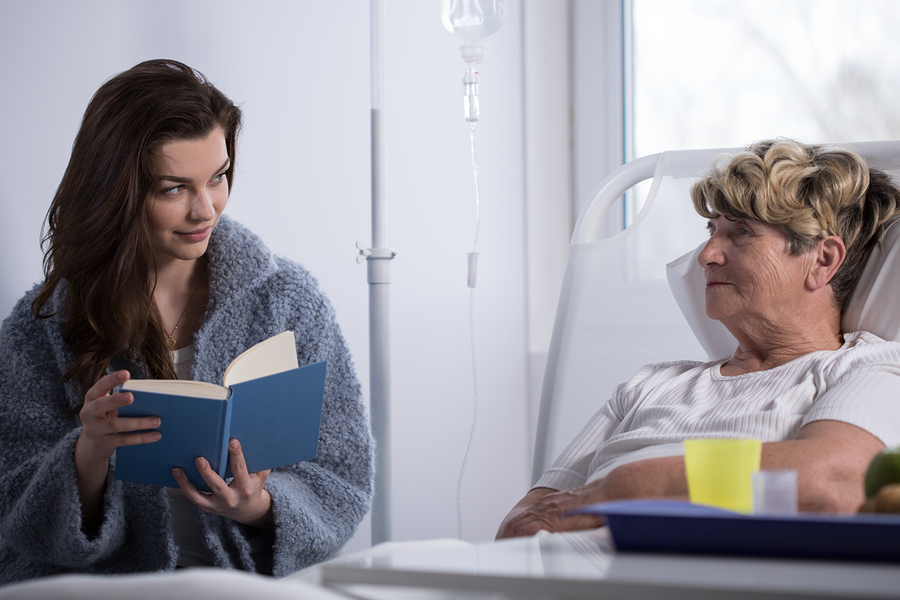
Listening is one of the simplest ways to show you care.
The life of a caregiver can often feel overwhelming -- particularly when the day-to-day demands of caregiving obscure the "big picture" view of why caregivers do what they do. If you're just going through the motions every day without stopping to reflect on your role and its impact, it's important to check in to make sure you're truly connecting with your aging loved one.
One simple way to improve your connections as a caregiver is to hone your listening skills. Let's count down three simple techniques for being a better listener, along with examining why they matter.
1. Stop, Look and Listen
If you're like most caregivers, you've probably got a mile-long to-do list. Indeed, there's plenty of fulfillment to be found in crossing items off of that list and moving on to the next one. The reality is that the list is probably endless: Cross off one task; another rises to the surface.
One thing that's not endless, however, is the amount of time you have to spend with your aging loved one. Rather than getting mired down by everything you have to do, stop whatever you're working on and commit to truly listening during your conversations and interactions. This may mean that the dishes don't get done or the laundry doesn't get folded, but it also delivers an important, often unheard message to seniors: What they have to say matters. Because, while you may take great pride in your multitasking skills, true listening requires a distraction-free environment and 100 percent of your attention.
Don't just listen with your ears. Visual cues are also critical -- particularly if you're communicating with someone who may struggle with finding the right words and/or be experiencing cognitive decline. Maintain eye contact throughout your conversation and pay attention to body language which can help you not only hear what's being said, but also what might be going unsaid.
Keep your own body language in mind, as well. Certain gestures and movements may be barriers to communication due to the messages they convey. For example, crossed arms may be perceived as stubborn or defensive, while hands on hips may come off as aggressive or confrontational.
Sometimes even professional caregivers need to step back and remember the importance of listening and knowing that patients and family members of patients are also listening. In this video, The Art, Science and Spirit of Caring, Maria Wellisch, RN recounts the lessons she learned as she sat by her 15 year old daughter's hospital bed for six days following a tragic automobile accident. It's a touching story that will open your eyes to the importance of listening and caring.2. Be An Active Listener
A one-sided conversation benefits no one. If your goal is truly to understand your aging loved one, asking questions serves a valuable purpose.
In addition to helping clarify what your aging loved one is telling you, being an active listener shows that you care. This can build confidence and keep the lines of communication open in your relationship when more difficult topics and situations arise, such as end-of-life care.
3. Take Your Time
Perhaps your aging loved one is telling you something you already know. Perhaps you've heard this story or had this discussion multiple times before. While these talks may be easy to dismiss, reframing each conversation as an opportunity to deepen your bond with your aging loved one offers a different and valuable point of view.
If you're truly strapped for time or stuck in the middle of something that needs completing, avoid giving a rushed answer. Instead, table the conversation for later. Just be sure to circle back to it when you have the time to devote to it.
The most effective caregivers offer a winning combination of "hard" and "soft" skills. And while the former often seem more "mission critical" than the latter, working on your communication, listening, and open-mindedness can all be vital building blocks to promoting the most positive patient-caregiver interactions. The time is always right and each day offers a new opportunity to commit to becoming a better listener...and a better caregiver in the process.

Quiet, distraction-free settings are the best place to connect.
If you're looking for a comprehensive resource for family caregivers, check out our online Family Caregiver Guide.mmLearn.org offers a large library of free videos for caregivers of older adults, covering topics pertaining to senior care. Whether you are a healthcare professional or a family caregiver, if you are caring for an older adult we know that you will find mmLearn.org an essential learning and guidance tool for all of your caregiver training needs. For more useful content for caregivers, access our free database of online caregiver videos today.
